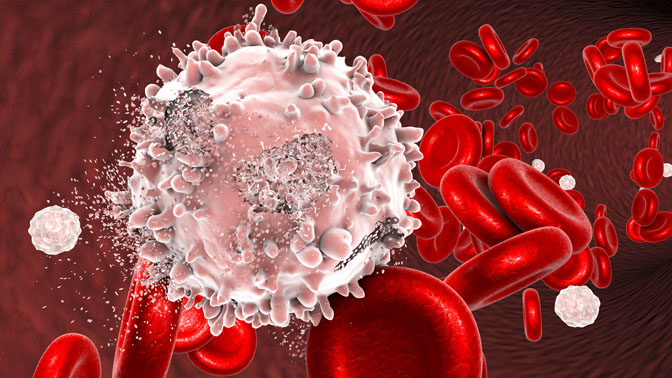
Combining drugs is a common strategy for hard-to-treat cancers. Understanding how they work together is equally important and may lead to new and improved treatment strategies.
A study led by Dr. Aaron Schimmer, Research Director at the Princess Margaret Cancer Centre, and Dr. Li Zhang, Senior Scientist at Toronto General Hospital Research Institute, aimed to investigate why a new drug combination was effective at treating acute myeloid leukemia (AML) in patients who are not eligible for standard chemotherapy.
This powerful drug combination includes two next-generation therapies: Venetoclax, a drug that blocks a protein needed for cell survival, and Azacytidine, an epigenetic therapy that modifies gene expression.
Until now, little was known about how these two drugs work in combination to better target and destroy cancer cells by increasing the killing function of immune cells called T cells.
Using a subset of human T cells derived from healthy donors, the researchers treated the cells with Venetoclax. Treatment activated a group of T cells known to respond to threats and increased their ability to selectively kill AML cells in experimental models, without affecting their own survival. The researchers discovered that the drug did this by disrupting important mechanisms related to metabolism in T cells.
When looking at the effects of adding Azacytidine in combination with Venetoclax, they found that the Azacytidine primed AML cells for killing by T cells by inducing an immune response that mimicked a viral infection.
“Our findings reveal the biological mechanisms behind this drug combination, which were corroborated in patient samples,” says Dr. Schimmer. “More importantly, it highlights the potential of combining Venetoclax with adoptive T cell therapy—a technique where we can harvest and expand T cells from patients and better arm them to target and destroy cancer cells.”
This work was supported by the Canadian Cancer Society, the Canadian Institutes of Health Research, the Ontario Institute for Cancer Research, the Government of Ontario, the National Cancer Institute, the Cancer Prevention & Research Institute of Texas and The Princess Margaret Cancer Foundation. M Andreeff holds the Haas Chair in Genetics. L Zhang holds the Maria H. Bacardi Chair in Transplantation.
Lee J, Khan DH, Hurren R, Xu M, Na Y, Kang H, Mirali S, Wang X, Gronda MV, Jitkova Y, MacLean N, Arruda A, Alaniz Z, Konopleva MY, Andreeff M, Minden MD, Zhang L, Schimmer AD. Venetoclax enhances T cell-mediated anti-leukemic activity by increasing ROS production. Blood. 2021 Mar 16. doi: 10.1182/blood.2020009081.

Dr. Aaron Schimmer, Research Director, Senior Scientist and Staff Physician at the Princess Margaret Cancer Centre.




